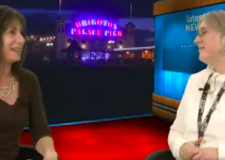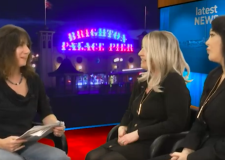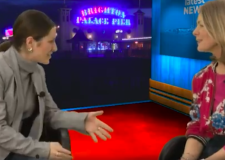Interview: Cine City: Shame
Director Steve McQueen talks about the challenges of making Shame, the pressure of following up Hunger and why he doesn’t want a ‘career’

London-born Steve McQueen’s first film, Hunger, about IRA hunger striker Bobby Sands, was awarded the Camera d’Or in Cannes, as well as a BIFA and BAFTA for most promising newcomer. A man of diverse talents, he was awarded the Turner Prize in 1999 for three visual art works, including Deadpan and Prey, which focused on a tape recorder playing a tap dance.
His second feature, Shame, shows no signs of an artistic lull as it has been nominated for 7 British Independent Film Awards, including best director and best film. Written by acclaimed screenwriter Abi Morgan, the story focuses on the thirtysomething high-flying New-Yorker, Brandon (Michael Fassbender). A successful executive with an overwhelming sex drive that he satisfies in whatever way he can. When his younger sister Sissy (Carey Mulligan) comes to stay, his routine is further disrupted, causing Brandon to implode.
Where did you grow up? And what was your artistic background? Did you see a lot of films or theatre?
I grew up in Ealing. Books and British TV. It was on all the time. It was like a fireplace. It was how I was educated – wildlife programmes, documentary programmes, bang bang bang. Play for Today. Everything. British TV, when I grew up, was a library.
Did you always want to make films, even when you were primarily a visual artist?
When I was in art school, I wanted to be in film school. When I was in film school, I wanted to be in art school. I was back and forth, really. I was in NYU in 1993 and I hated it. I only could afford to go because I got a scholarship and my uncle lived in Brooklyn. But after three months I left. I came back to England and did my own thing. If I had gone to film school, maybe my language would’ve been tainted. Who knows? I was more interested in art because it was much more difficult.
Did you feel any pressure after Hunger to follow it up?
No. I didn’t feel any pressure. For me, this is my first film. Every film will be my first film. I don’t know what I’m doing. I’m Mr Magoo, bumping into things! I always wanted to be a little bit naïve. I’m an amateur. I always want to be an amateur. I’m not interested in being a filmmaker.
So you don’t want a career, as such?
Career – I don’t know what that is. If somebody asks me to do another movie, then I’ll do one. But what I mean by amateur is to just have a freedom. Not be constrained by certain ways or techniques of doing things. But to have the opportunity to be free.
There are certain scenes – like the one in the night club with Sissy and Brandon – where little is going on yet much is happening under the surface. How much do you try and put that into words at script stage?
I think it’s more about atmosphere. I think one has to trust a certain kind of atmosphere. It’s difficult to write about. The ambience, the feeling, the emotion has to come through performance, through the camera, through trust. That particular performance by Carey…I wanted to make ‘New York, New York’ into a blues number. It’s not Liza Minnelli or Frank Sinatra. It’s not a triumphant song. It’s a really sad song. I thought, ‘This could be one of those times where Brandon is confronted with Sissy, and she can have a direct communication with him, and he can’t get out.’ He’s taken someone to the club, he’s in a situation where he can’t leave, he’s basically trapped, so he has to listen. He’s confronted with his past, through his sister’s performance. And you just have to trust things like that. It can’t happen in novels or plays, It can only happen in cinema. That’s cinema, and you have to trust what the possibilities can be. Sometimes it’s scary, but you just have to have faith in cinema.
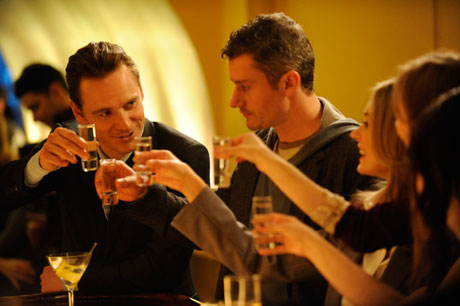
Did you think much about Brandon and Sissy’s backstory? It didn’t seem like they’d had a very happy childhood…
What we wanted to make a situation that was familiar rather than mysterious. When we all go to the cinema, we bring our history, our luggage, our baggage, so we have some kind of idea of what possibly could of happened. I didn’t want to give you a long yarn about this is what happened to Sissy, this is what happened to Brandon. We all have an understanding of what possibly could have happened. And there are tells in the film, where the past comes into the present, and you can have an idea of that. Often when you meet someone brand new in your life, you have no idea who that person is. You just meet that person, and then from your relationship with that person, you get an idea of possibly who or what that person is. So I want people to bring their own history to the cinema at that point, in order to make it much more familiar.
What were the challenges you had to face on this? Were they different being a second-time director?
This is a continuation of Hunger really. It’s one film as far as I’m concerned. It’s just a case of trying things out, failing and trying them again and hopefully they work. Often what people think doesn’t work actually does. So it’s a situation of experimenting, collaborating with great people and getting it done. Just trying to do something which has some kind of meaning. It’s very simple really.
Are you aware of any artistic influences when you are directing?
When I’m looking through a lens for a shot or a scene, I’m not thinking about Goya or Tarkovsky, I’m thinking ‘What’s the best thing I can do in this present mood?’ Certain things are coincidence. But it’s different textures, different aesthetic, and a different feel with film, celluloid, compared to painting. So I’m not thinking of painting at all. I’m just thinking about the actual content, the story, the narrative. Film will take care of itself. You’ve got to focus on what you’re looking at, and how you portray that in the right way. The best piece of advice I’ve ever heard about that, as far as images and content are concerned, was from a very good friend of mine, Robbie Müller, who used to work with Wim Wenders, and Jim Jarmusch and Lars von Trier. He said ‘A camera move should be like a cat jumping onto a table; effortless. That’s it. That’s enough.’ So the content actually has to tell you what it wants. The form is there to give it some sort of reality.
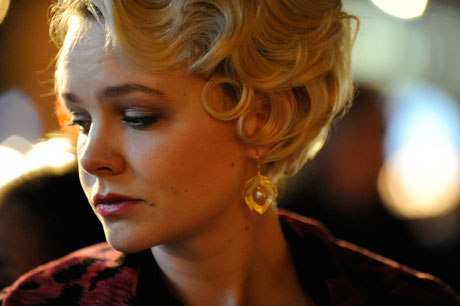
What about using long takes, where does that come from?
It comes from the actor and the environment. You write something, and then you go to the locations, and the locations are not what you thought they were in your mind’s eye. So you have to adapt to the environment and you have to adapt to the actor and what they want, and their needs. There was one great time, I remember, with Michael. We were shooting quite fast and he got quite angry with us. Like ‘Steve, what is this? You’re putting me in this shot. I don’t want to do that!’ That was the biggest wake up call. It was very early on in the filming. So I thought, ‘Let’s see how he moves, let’s see what his ritual is, let’s move the camera.’ Again, it’s one of those things about the environment and the actor. Of course, you need to do those things in that frame that you need, but it’s almost like a dance in a way. How do you dance with your partner?
Why did you pick New York for the setting? Is it hell on Earth?
No, I love New York. Sometimes, starting points are to do with the last thing you did. So with Hunger, being in a prison cell in Northern Ireland, what happens if you turn it on its head? You have a place of excess and access. You have a place of choice, multiple choices and freedom, compared to being in a prison cell. So I like the idea of that environment. Then you put Brandon in the situation, who is not thinking about other people, just himself, then that’s interesting. It’s the total opposite to the previous situation. Then to feed this craving of sex, I think it’s the best place for this character. You can order a prostitute? What kind? There are thousands of choices. For Brandon, it’s a Mecca. He orders take-out food, take-in prostitutes…you don’t have to communicate with anyone. That’s the loneliness of New York. For a lot of people it can be very lonely and isolating. No-one cooks – everyone eats out or takes in.
Did you sense that Michael was finding the shoot tough?
Yes. Yes. But we’re here to support and push. That’s my job. To maintain and be the scaffolding, to prop him up. He went deep. He went very deep. What you see on screen for example, there is a beautiful bit on screen where Michael is waiting for the elevator, the doors open, he looks at the elevator, they close again and he sits down. That was improvised. I’m upstairs, and looking at him, and he’s not getting in the elevator. I’m thinking ‘What’s the matter with him?’ But it’s beautiful. He’s so in there. That’s genius. You can’t make that up. It’s a small detail but it adds so much. I have to stay in the mode too. That’s why you need a good crew too. There’s no way any director could stay focused for twelve hours a day. You need a good DP [director of photography] and a good producer.
One of the most surprising moments is when he goes to the gay club…
It’s sex. He gets beaten up. He’s provoking the guy, because he hates himself and wants to get beaten up. Then he tries to get in the club, but he can’t, and across the street there’s a gay bar. Let’s go, let’s go have some sex. Sex isn’t gay or straight – he wants sex. He goes there and gets what he wants.
Shame is released in the UK and Ireland on 13 January For more information visit www.facebook.com/shameuk or follow @shamefilm on twitter.



















